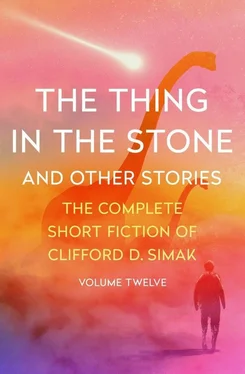The planet, or what he could see of it, was a dismal place. It was a cloudy day and he had trouble making out, so colorless was the land, where the horizon ended and the sky began. The ground was flat, a great plain unrelieved by trees or ridge, and covered here and there by patches of low brush.
He had landed near a path and in this he considered himself lucky, for he remembered from his indoctrination that the planet had no roads and not too many paths.
He hoisted his knapsack firmly into place and started down the path. In a mile or so he came to a signpost, badly weather-beaten, and while he wasn’t too sure of the symbols, it seemed to indicate he was headed in the wrong direction. So he turned back, hoping fervently he had read the sign correctly.
He arrived at the village just as dusk was setting in, after a lonely hike during which he met no one except a strange and rather ferocious animal which sat erect to watch him pass, whistling at him all the while as if it were astounded at him.
Nor did he see much more when he reached the village.
The village, as he had known it would, resembled nothing quite so much as one of the prairie dog towns which one could see in the western part of North America, back on his native Earth.
At the edge of the village he encountered plots of cultivated ground with strange crops growing in them; and working among some of these plots in the gathering darkness were little gnome-like figures. When he stopped and called to them, they merely stared at him for a moment and then went back to work.
He walked down the village’s single street, which was little more than a well-travelled path, and tried to make some sense out of the entrances to the burrows, each of which was backed by a tumulus of the ground dug up in its excavation. Each mound looked almost exactly like every other mound and no burrow mouth seemed to have anything to distinguish it from any of the others.
Before some of the burrows tiny gnome-like figures played—children, he supposed—but at his approach they scuttled rapidly inside and did not reappear.
He travelled the entire length of the street; and standing there, he saw what he took to be a somewhat larger mound, some little distance off, surmounted by what appeared to be some sort of rude monument, a stubby spire that pointed upward like an accusing finger aimed toward the sky.
And that was a bit surprising, for there had been no mention in his indoctrination—of monuments or of religious structures. Although, he realized, his indoctrination would be necessarily skimpy for a place like this; there was not a great deal known of the planet or its people.
Still, it might not be unreasonable to suppose that these gnomes might possess religion; here and there one still found patches of it. Sometimes it would be indigenous to the planet, and in other cases it would be survival transplantations from the planet Earth or from one of the other several systems where great religions once had flourished.
He turned around and went back down the street again and came to a halt in the middle of the village. No one came out to meet him, so he sat down in the middle of the path and waited. He took a lunch out of his knapsack, ate it, and drank water out of the vacuum bottle that he carried, and wondered why Reuben Clay had picked this dismal place in which to spend his final days.
Not that it would be out of keeping with the man. It was a humble place and Clay had been a humble man, known as the “Spaceman’s Van Gogh” at one time. He had lived within himself rather than with the universe which surrounded him. He had not sought glory or acclaim, although he could have claimed them both—at times, indeed, it appeared that he might be running from them. Throughout his entire life there had been the sense of a man who hid away. Of a man who ran from something, or a man who ran after something—a seeking, searching man who never quite caught up with the thing he sought for. Lathrop shook his head. It was hard to know which sort Clay had been—a hunted man or hunter. If hunted, what had it been he feared? And if a hunter, what could it be he sought?
Lathrop heard a light scuffing in the path and turned his head to see that one of the gnome-like creatures was approaching him. The gnome was old, he saw. Its fur was gray and grizzled and when it came closer he saw the other marks of age upon it—the rheumy eyes, the wrinkled skin, the cragged bushiness of its eyebrows, the cramped stiffness of its hands.
It stopped and spoke to him and he puzzled out the language.
“Good seeing to you, sir.” Not “sir,” of course, but the nearest translation one could make.
“Good hearing,” Lathrop said ceremoniously.
“Good sleeping.”
“Good eating,” Lathrop said.
Finally they both ran out of “goods.”
The gnome stood in the path and had another long look at him. Then: “You are like the other one.”
“Clay,” said Lathrop.
“Younger,” said the gnome.
“Younger,” Lathrop admitted. “Not much younger.”
“Just right,” said the gnome, meaning it to be a diplomatic compliment.
“Thank you.”
“Not sick.”
“Healthy,” Lathrop said.
“Clay was sick. Clay …” Not “died.” More like “discontinued” or possibly “ended,” but the meaning was clear.
“I know that. I came to talk about him.”
“Lived with us,” said the gnome. “He (die?) with us.”
How long ago? How did you ask how long? There was, Lathrop realized with something of a shock, no gnome-words for duration or measurement of time. A past, present and future tense, of course, but no word for measurement of either time or space.
“You …” There was no word for buried. No word for grave.
“You planted him?” asked Lathrop.
He sensed the horror that his question raised. “We … him.”
Ate him? Lathrop wondered. Some of the ancient tribes of Earth and on other planets, too, ate their dead, thereby conferring tender honors on them.
But it was not eat.
Burned? Scaffolded? Exposed?
No, it was none of those.
“We … him,” the gnome insisted. “It was his wish. We loved him. We could do no less.”
Lathrop bowed gratefully. “I am honored that you did.”
That seemed to mollify the gnome.
“He was a harmless one,” said the gnome. Not exactly “harmless.” Kind, perhaps. Uncruel. With certain connotations of soft-wittedness. Which was natural, of course, for in his nonconformity through lack of understanding, any alien must appear slightly soft-witted to another people.
As if he might have known what Lathrop was thinking, the gnome said, “We did not understand him. He had what he called a brushandpaints. He made streaks with them.”
Streaks?
… Brushandpaints? Sure, brush and paints.
Streaks? Of course. For the people of this planet were colorblind. To them Clay’s painting would be streaks.
“He did that here?”
“Yes. It here.”
“I wonder. Might I see it?”
“Certainly,” said the gnome. “If you follow me.”
They crossed the street and approached a burrow’s mouth. Stooping, Lathrop followed down the tunnel. Ten or twelve feet down it became a room, a sort of earthen cave.
There was a light of a sort. Not too good a light, a soft, dim light that came from little heaps of glowing material piled in crude clay dishes placed about the burrow.
Foxfire, thought Lathrop. The phosphorescent light of rotting wood.
“There,” said the gnome.
The painting leaned against one wall of the burrow, an alien square of color in this outlandish place. Under ordinary circumstances, the faint foxfire light would have been too feeble for one to see the painting, but the brush strokes on the canvas seemed to have a faint light of their own, so that the colors stood out like another world glimpsed through a window beyond the foxfire dimness. As Lathrop looked at the propped-up square, the glowing quality seemed to become more pronounced, until the picture was quite clear in all its unfinished detail—and it was not a glow, Lathrop thought; it was a shiningness.
Читать дальше












